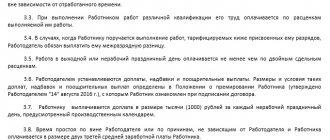Many organizations, in order to save money on labor costs and optimize personnel policies, decide to “rent” specialists from other companies, having previously concluded an agreement for the provision of personnel. Abroad, this practice has already become commonplace, but for a long time Russian legislation did not have any rules regarding the provision of personnel to other organizations. Only in 2016, changes were made to the Labor Code of the Russian Federation and other regulatory documents, but for most business entities, providing the labor of their employees to another company is prohibited.
Outstaffing - what is it in simple words? Definition of outstaffing
The simplest definition of outstaffing is outstaffing.
That is, outstaffing is the reassignment of workers to the staff of another company, as a result of which the workers continue to work at the old workplace and perform the same functions, but the role and responsibilities of the employer are officially transferred to a third-party outstaffing company. In other words, being a high management technology, outstaffing is a form of relationship between an employer and its employees, in which the employer transfers, officially registering, his employees to the staff of another outstaffing company, concluding an outstaffing agreement with it.
At the same time, employees continue to work on the territory of the previous employer and perform all their previous functions, as before.
However, the official employer according to the papers is now an outstaffing company, which has registered workers in its company under an employment contract and now performs all the functions of an employer: maintains personnel records of employees, monitors workers’ documents, calculates taxes, pays wages, interacts with government agencies, etc.
Personnel outsourcing from STS GROUP
- STS Group organizes work at more than 800 facilities of various profiles in 8 regions of the country. This allows us to approach the client’s task with knowledge of the specifics of servicing specific areas and regions of business.
- Unified management and service standards, a wide geography of business presence ensure high quality project management regardless of the region in which the client’s enterprise is served.
- Clear regulation and automation of business processes, the use of the latest personnel technologies in STS GROUP provide clients with accuracy, efficiency, and ease of interaction on any issues.
The use of outstaffing: in what cases do they resort to removing employees from the company's staff?
Employers resort to outstaffing services when it is necessary to officially employ an employee so that his work activity on the employer’s territory is legal, but for some reason the employer does not want or cannot officially place the employee on his staff.
Thus, HR outstaffing is used when:
- The employer needs to reduce costs for employee salaries and payroll taxes.
- The employer wants to relieve itself of the financial and resource burden of servicing personnel and maintaining their personnel records, simplify office work and accounting, and reduce the risk of errors in the field of labor and tax legislation.
- The employer wants to use cheap foreign migrant labor, but at the same time does not want to monitor the workers’ migration documents or hire an additional accountant and personnel officer for this purpose.
- The employer wants to reduce legal liability to employees and be completely invulnerable not only to its employees, but also to government agencies and inspections by labor services, salary commissions, etc. (the employer’s responsibility automatically passes to the outstaffing company)
- It is required to increase the number of employees without losing the simplified tax system.
- The employer does not want to employ workers who are on a probationary period or temporary workers.
- An employer wants to hire a specialist from another region, but does not want to open a branch or representative office there.
Areas of application of outstaffing
In practice, it is clear that outstaffing is most often done by low-skilled workers, migrant workers, and unskilled workers who carry out their labor activities in a variety of industries.
Outstaffing of temporary staff is also often used. The most common provision of outstaffing services is in construction, repair, installation of equipment, cleaning, trade, food and manufacturing industries and outstaffing of guest workers in general, including in the field of cleaning, construction, logistics and warehouses.
Most often in Russia it is migrants who are transferred to outstaffing. Also, employers are often interested in outstaffing of construction personnel, outstaffing of drivers, outstaffing of low-skilled workers, outstaffing of horeca and hospitality personnel, outstaffing in cleaning and outstaffing of foreign nationals-general workers and, for some reason, accounting outstaffing.
Employers are somewhat less likely to be interested in outstaffing for homeowners associations and IT outstaffing, including programmers. And even less often, employers transfer managers to outstaffing.
Additional questions
When you can't do without it
Often, companies providing personnel outsourcing services are approached when it is necessary to select a team for a short-term or one-time project, to perform seasonal work, or when there is no opportunity or desire to significantly increase the staff. Outsourcing of temporary staff is also the best option if you need to replace an employee who has gone on long leave or is on sick leave. However, first of all, personnel outsourcing is considered as an opportunity to transfer to the outsourcer the functions of selecting and hiring personnel on a long-term basis. Among the companies interested in such a service are factories, supermarkets, shopping and entertainment centers, catering establishments, hotels, warehouses, etc.
HR potential of outsourcing
Today, almost any function can be outsourced. At the same time, most often people turn to companies providing personnel outsourcing services in cases where the following is required:
- lawyers and accountants;
- IT specialists;
- drivers, couriers, loaders, storekeepers;
- cleaning specialists,
- secretaries and office managers;
- personnel workers;
- translators;
- workers (for example, mechanics or plumbers).
In what areas is personnel outsourcing service used?
Temporary or permanent workers are provided for the following areas:
- trade (sellers, managers, cashiers, merchandisers, loaders, storekeepers, sales representatives, cleaners);
- production (workers, specialists, craftsmen, engineers, packers, packers, drivers, commodity experts);
- warehouses (loaders, forwarders, storekeepers, cleaners, drivers, pickers);
- hotel and restaurant business (administrators, bartenders, waiters, cooks, bakers, dishwashers).
This is also important to know:
Can they be fined at work and for what reason?
Personnel outsourcing can be used to hire any workforce, accounting, human resources, administrative and service personnel, including low-skilled workers (janitors, leaflet distributors, etc.).
Outsourcing of sales personnel is popular among large chain stores, since the provision of sufficient labor force directly affects the efficiency of customer service and the rating of the chain. Both commercial and municipal enterprises, regardless of the type of activity, can conclude an agreement for the service and provision of workers.
How are outsourced workers registered?
To use personnel outsourcing, you must contact one of the outsourcing services in Moscow and the Moscow region. Companies engaged in the provision of labor accept applications, conduct a competitive selection among the candidates available in the database, and then provide the employer with a ready-made set of service and sales personnel.
In essence, personnel outsourcing in Moscow is not the employment of workers, but the conclusion of a contract with a third-party company. Cooperation can be seasonal, temporary, permanent, at the discretion of the customer and the need for personnel.
Outstaffing: pros and cons for the employer
Advantages of outstaffing for employers
The benefits of outstaffing for the employer and the financial benefits of outstaffing are obvious.
First of all, employers order outstaffing services in order to relieve their staff of personnel officers and accountants and transfer the maintenance of personnel records and all problems associated with formalizing relations between employees and the employer to a third-party organization.
For example, in Russia, outstaffing of foreign personnel is most common, since recruiting foreigners and maintaining their personnel records requires knowledge of the intricacies of migration legislation, in particular a complete list of documents for foreigners to work in the Russian Federation, their validity periods, the procedure for renewing patents and permits , and of course the availability of all forms of notifications and knowledge of who and when to notify.
And it is in cases with the employment of foreign citizens that any, even the smallest violation associated with ignorance of the procedure for hiring foreigners, can lead the employer’s company to a million-dollar fine for each employee.
And therefore, in order to certainly avoid fines for illegal immigrants, inspections by authorities, suspension of the company’s activities and other migration risks, employers prefer to register their workers as part of the staff of a third-party company - an outstaffer, with which these workers enter into an employment contract, physically continuing to work on the employer’s territory. And after that, all responsibility for the legality of the work of foreign employees passes to the outstaffing agency, which is now officially the employer according to the papers.
Another undeniable advantage of outstaffing for an employer, in addition to getting rid of personnel risks, is the employer’s ability to increase the number of its employees and at the same time retain the simplified tax system for its company.
Also, when outstaffing general workers, the employer permanently saves himself from all commissions on remuneration.
The main benefit of outstaffing for an employer is the opportunity to save not only on paying fines, but also to reduce salary costs for personnel and the tax burden by transferring them to the outstaffing company and making them an official expense, confirmed by an electronic book of purchases and sales.
In this vein, employers have recently increasingly used outstaffing as an anti-crisis management tool, since the removal of employees from the company’s staff allows reducing the company’s costs for paying employees, and therefore reducing the cost of producing the final product as a whole.
Also, the employer’s benefit from outstaffing lies in the fact that he does not need to hire an additional personnel officer, accountant, or migration lawyer, since their functions are taken over by outstaffing agencies as part of the service.
Disadvantages of outstaffing for employers
The disadvantages of outstaffing for an employer are primarily related to its risks.
The disadvantages of outstaffing are that the Employer takes a lot of risks when contacting an outstaffing agency to transfer employees from the company's staff, since from the moment the outstaffing agreement is concluded with the service provider, the workers become under the responsibility of this outstaffer, who, in turn, must not only officially register the employees with him to the state, but pay taxes for them, keep personnel records, monitor the deadlines and forms of documents and notify the Main Directorate for Migration of the Ministry of Internal Affairs (FMS) about the work of foreign employees.
And here the employer runs the risk of stumbling upon a front company that provides outstaffing services illegally - without state accreditation as an outstaffing agency or that does not provide outstaffing services to the full extent.
In the latter case, it turns out like this: the employer is confident that the employees have been officially transferred to the company’s staff through an outstaffer, which means there are no labor or migration risks associated with the use of workers’ labor.
At the same time, unscrupulous outstaffers, after receiving payment under an outstaffing agreement, simply let workers’ personal files go free - they do not pay salary taxes, do not maintain personnel records, and do not monitor the availability and validity of workers’ documents.
And it turns out that there are employees working on the employer’s territory who have not been officially registered anywhere, no one has paid taxes for them, their permits are expired or missing altogether, and at the same time, the outstaffing agreement, which was supposed to protect the interests of the employer, in practice turns out to be a piece of paper signed by a fake company.
And now the employer will be responsible for all illegal immigrants who were found on the company’s territory. At the same time, we are talking not only about fines and additional charges, but also about criminal liability for non-payment of salary taxes.
Therefore, before contacting an outstaffing agency and concluding an outstaffing agreement with it, be sure to make sure that the new partner is reliable and that outstaffing services are provided by an accredited employment agency with an outstaffing license.
Reliable outstaffing companies can be easily distinguished by several characteristics:
- An outstaffing recruitment agency must have official state accreditation as a private employment agency (see what the certificate looks like below).
- Reliable outstaffing companies have been on the market for more than one year, just check the legal entity that provides outstaffing services.
- A legal outstaffer always pays salary taxes for employees transferred to the staff.
- A reliable outstaffing company always concludes an employment contract with the employer’s employees and fully maintains all personnel records for all employees.
- A reliable outstaffing service provider will always provide an official outstaffing agreement to the employer for review.
A small preliminary check using these criteria will allow the employer to quickly solve the main problem of outstaffing personnel and avoid the risks of outstaffing with unscrupulous partners.
You can also try to look at the ratings of outstaffing companies and see what partners or employees on staff think about them.
Types of services that involve the use of hired personnel
There are several types of employees. They all involve different ways of managing temporary staff.
Personnel outsourcing
Outsourcing is when a company transfers part of its functional responsibilities to another organization that is a professional in this field.
For example, it is not profitable for an enterprise to have an accountant on its staff, or maybe this organization is still very small and consists of 1-2 employees who simply do not know how to do accounting, prepare reports, etc. Then for help you can contact a company that will conduct accounting affairs for a fee.
This is also important to know:
For what reason does the employer not pay wages?
This type of contractual relationship is divided into the following categories:
- Outsourcing of working personnel. This is the most common type of outsourcing. Many organizations hire workers to clean their premises. Managers of customer companies believe that it is more profitable to pay a cleaning company than to keep a permanent employee on staff;
- Outsourcing of construction personnel. Most companies have production and office premises that periodically have to be repaired. It is for repair and construction work that they turn to the relevant companies. For a customer company, if its business is not related to construction, it is not profitable to have permanent employees with construction specialties on its staff;
- Outsourcing of accounting personnel. It is impractical and economically unprofitable for small enterprises to keep a permanent accountant on staff. Then they turn to a company for help, which helps maintain all the necessary documentation and reporting;
- Outsourcing of support staff. This is also a very common type of outsourcing, because... performing companies can provide security and courier services. Not every customer organization is ready to hire a security guard or courier as a permanent staff member. That is why they turn to specialized companies.
There are many categories and types of employees. This includes outsourcing of sales personnel, outsourcing of warehouse personnel, etc. In fact, you can order any service, from cleaning the premises to management positions. The main thing is to calculate in advance what is more profitable, to keep a permanent employee, or to use the services of professional companies.
Outsourcing of temporary staff involves a relationship between two parties, the customer and the performing company. They are the ones who enter into an agreement for the provision of services without the participation of third parties.
Outstaffing of personnel
Outstaffing is when an enterprise removes a permanent employee from its staff and places him in another organization. In fact, this means a change in management, but in reality the person worked in his position and still works.
Simply put, the agency officially recruits the client company’s personnel into its staff.
Personnel outstaffing services are provided by an accredited recruitment agency.
Temporary staff services
If a company needs to rent an employee for a short period of time (from 1 day to 3 months), then the customer company contacts a recruitment agency that recruits temporary staff. Such an agency quickly finds a temporary worker with the required qualifications who will carry out the tasks of the customer company.
The official documents on the basis of which temporary personnel are managed are the employment contract and the contract for the provision of personnel.
Depending on the work performed, the following types of use of temporary personnel can be distinguished:
- Working personnel for rent (cleaners);
- Rental of warehouse personnel (drivers, packers, etc.);
- Rental of production personnel (merchandisers, salespeople, etc.).
Sometimes temporary staff become permanent. If the head of the enterprise likes the hired employee, he can offer him a place on the staff.
However, it often happens that temporary staff are not interested in high-quality and fast work. He comes to a temporary job to work the allotted time, performing his duties poorly.
Sometimes this depends on human qualities, and sometimes it is due to the fact that the employee has not completed an internship, has not joined the team and has little idea of exactly what responsibilities are assigned to him.
In order to prevent this from happening, the head of the enterprise must talk as clearly as possible about the responsibilities of such an employee, in addition to the employment contract, spell out all the situations that may arise between the parties, conduct internships and training, introduce permanent staff, and perhaps come up with a reward system for quality work performed. work.
Depending on the category of personnel hired, the employee may be qualified or unskilled. Very often the quality of the work performed depends on this.
For example, if you hired an experienced programmer to create a website for your organization, then with a high probability you can say that the work will be done efficiently. If a newbie takes on the task, the work may not be completed as professionally as you would like.
Personnel leasing
Personnel leasing is when an agency enters into an employment contract with an employee and places him at the disposal of the customer company for a long period of time. The maximum period of stay at one facility cannot exceed 9 months.
Personnel leasing should be carried out by special organizations that have been accredited and have permission to provide such services.
When ordering temporary staff leasing, the client company must enter into a staff leasing agreement with the recruiting agency. After which the hired employee can begin to perform his duties.
Outstaffing: pros and cons for the employee
Advantages of outstaffing for an employee
What is the advantage of outstaffing for employees?
First of all, this is, of course, official registration as a company, followed by maintaining personnel records of employees and submitting tax reports. Outstaffing of workers assumes that the service provider, re-registering the worker as a staff member, enters into an employment contract with him, and officially becomes his employer, who from now on:
- Pays salary taxes and makes timely contributions to funds for each employee
- Responsible for the stability of wage payments
- Provides labor and social guarantees for employees
- Monitors the availability and deadlines of documents, including permits and migration.
This is a particularly useful advantage for foreign employees in the outstaffing service, who carry out their work activities on the territory of the Russian Federation and have little understanding of migration laws, in contrast to an outstaffing company, which employs employees who practice labor and migration laws on a daily basis and specialize in them.
Also, outstaffing has the advantage for CIS workers - complete confidence in the safety and legality of their work. A foreign outstaffing employee knows that his documents are in order and in full, the expiration dates are monitored by the outstaffing employer, tax deductions are made on time, salaries are not delayed, and for any migration issues you can contact the employer’s personnel service.
Also, the official registration of a foreign worker as a member of the company confirms the legality of the migrant’s work on the territory of the Russian Federation, which in turn in the future may help him obtain a residence permit in Russia or Russian citizenship.
Disadvantages of outstaffing for an employee
Now let’s look at the risks of outstaffing and the disadvantages of outstaffing an employee from the point of view of the employee himself.
Possible risks of outstaffing in this case are related to the fact that, being transferred out of staff to another company, the employee may be deprived of some benefits and privileges that a full-time employee of the employer may have. This disadvantage of outstaffing can also indicate that the transferred employee is unlikely to make a career in his professional field.
It is also believed that outstaffing company personnel have the lowest wage level.
Also, possible risks of outstaffing for employees include the risk of ending up with an illegal outstaffing company that will not pay taxes for employees in full or will not properly register them as employees.
Perhaps these are the most important disadvantages of outstaffing that employees whom the employer transfers to the company’s staff should be aware of.
If you have a different opinion about the conditions of outstaffing from the point of view of an out-of-staff employee, please share it in the comments to the article. We will be very interested to read reviews about outstaffing from our readers.
Vicarious liability
For the obligations of the employer, including obligations related to the payment of wages and other amounts due to an employee who is sent under a contract for the provision of personnel, the receiving party bears subsidiary liability (Article 341.5 of the Labor Code of the Russian Federation).
In other words, if a private employment agency has a debt to employees that it cannot repay, then the money can be recovered from the receiving party (the organization or individual entrepreneur that used the labor of these workers). In addition to salary, this can be monetary compensation for the employer’s violation of the deadline for paying wages, vacation pay, dismissal payments, etc.
To fulfill the requirement of subsidiary liability, the contract for the provision of personnel can include a condition that the contractor provides the customer with information on a monthly basis (or at other intervals) about the absence of wage arrears to employees.
The terms of remuneration for workers sent under a personnel supply agreement must be no worse than those of employees of the receiving party performing the same functions and having the same qualifications (Article 341.1 of the Labor Code of the Russian Federation).
Professional press for accountants
For those who cannot deny themselves the pleasure of leafing through the latest magazine and reading well-written articles verified by experts. Select a magazine >>
Why is it considered that outstaffing is prohibited from 2021? Outstaffing in 2021
Not everyone still has a clear understanding of whether outstaffing in Russia is completely prohibited from 2021 or whether it is possible to use outstaffing services legally.
They started talking about a ban on outstaffing in Russia in 2021 when the first mentions of agency labor appeared in the text, at that time still draft regulatory acts.
Then many thought about a ban on outstaffing and agency labor, linking this ban on outstaffing to the law that came into force on January 1, 2021. Many even called this law the anti-outstaffing law.
However, in fact this is not at all the case. There was no law banning the use of outstaffing and agency labor - only Federal Law No. 116 “On Amendments to Certain Legislative Acts” of 05/05/2014 came into force, which in no way indicates that outstaffing is completely prohibited from 2021 , but on the contrary gives an official definition of agency work and regulates its use in Russia from 2021.
In other words, with the entry into force of this law, outstaffing was, of course, not prohibited. Only the conditions were determined under which legal entities can provide and use outstaffing services.
Thus, there is no complete ban on outstaffing in Russia today, but there are some restrictions on the use and provision of outstaffing.
We will dwell on them in more detail in order to finally debunk the myth about the ban on outstaffing in 2021.
Administrative responsibility
In case of violation of the new rules, including the provision banning the use of agency labor, the following measures of administrative liability may occur (Part 1 of Article 5.27 of the Code of Administrative Offenses of the Russian Federation):
- for organizations – a fine from 30,000 to 50,000 rubles;
- for individual entrepreneurs – a fine from 1000 to 5000 rubles;
- for officials - a warning or a fine from 1000 to 5000 rubles.
A repeated violation committed within one year from the date of prosecution for a previous similar violation faces more serious sanctions (Part 4 of Article 5.27 of the Code of Administrative Offenses of the Russian Federation):
- for organizations – a fine from 50,000 to 70,000 rubles;
- for individual entrepreneurs – a fine from 10,000 to 20,000 rubles;
- for officials - a fine of 10,000 to 20,000 rubles or disqualification for a period of one to three years.
Outstaffing: changes for 2021
Outstaffing and Russian legislation: law on outstaffing 2016
On January 1, 2021, Federal Law No. 116 “On Amendments to Certain Legislative Acts” dated 05/05/2014 came into force, which not only introduced the concept of agency labor into legislation, but also fully regulated outstaffing from 2021.
Agency labor was commonly understood as work performed by an employee in agreement with the official employer, but under the control of a person who is not officially the employer of this employee.
The same “outstaffing law” in 2021 also introduced some restrictions on the use and provision of outstaffing services. You can view and download the full text of the 2016 outstaffing law on this page.
Restrictions on the provision of outstaffing services in 2021
For example, in 2021, only the following can provide outstaffing services:
- Affiliates
- Private employment agencies
In the first case, the organization has the right to send workers to perform work to its affiliated legal entity, which is a member of the shareholders agreement.
In the second case, only a legal entity accredited by the employment service as a private employment agency can provide outstaffing services to other legal entities.
That is, if previously any company could provide outstaffing services, now only employment agencies that have received official state accreditation can do this.
Also in 2021, the following outstaffing rules apply:
- The salary of outstaffing employees cannot be lower than that of employees of the same specialty of the receiving party.
- An employee who is transferred under an outstaffing agreement to perform work that involves harmful and dangerous conditions must receive compensation.
- An employee cannot be transferred to perform work to the receiving party for a period of more than 9 months.
- The number of employees that the outstaffer transfers to the receiving party to perform the work cannot exceed 10% of the total number of employees of the employing company.
Moreover, in 2021 the use of outstaffing is completely prohibited in the following cases:
- To perform work that is classified as hazard class I and II or has harmful working conditions of degrees 3 and 4.
- To perform work as forwarders and crew members of sea vessels and mixed navigation vessels.
- To perform work as a replacement for workers participating in a strike.
- To perform work during downtime of the employer's production.
- If the employer's company is in the process of bankruptcy.
- If the employer's company introduces a part-time work schedule in order to preserve jobs under the threat of dismissal of employees.
Registration of labor relations with employees
A private employment agency is obliged to conclude an employment contract with an employee who will be temporarily sent to work in another organization or to an individual and make an entry in his work book (Part 9 of Article 341.2 of the Labor Code of the Russian Federation). The receiving party does not enter any information into the workers’ work book.
Employment contract
The employee’s employment contract must stipulate that he will work in the interests, under the management and control of an individual or organization that is not his employer. At the same time, this condition can be included in the employment contract only in strictly specified cases, namely (Article 341.2 of the Labor Code of the Russian Federation):
- if an employee is temporarily sent to an individual who is not an individual entrepreneur for the purpose of personal service or assistance with housekeeping;
- if an employee is sent to an organization or individual entrepreneur to temporarily perform the duties of absent employees, who retain their place of work;
- if an employee is sent to an organization or individual entrepreneur to carry out work related to a deliberately temporary (up to nine months) expansion of production or the volume of services provided. If through an employment agency it is intended to attract more than 10 percent of the average number of workers to such work, then when making this decision it is necessary to take into account the opinion of the trade union (clause 10 of article 18.1 of Law No. 1032-1).
Who can be referred
Categories of workers who can be sent to work for the receiving party have been determined. These include:
- persons studying full-time;
- single and large parents raising minor children;
- persons released from institutions executing a sentence of imprisonment.
And cases when a private agency can recruit personnel to perform temporary work for a customer are contained in Article 59 of the Labor Code on a fixed-term employment contract. All these conditions are determined by the nature of the proposed work.
In particular, a fixed-term employment contract is concluded for the period of:
- performing the duties of an absent employee;
- performing seasonal work;
- performing temporary (up to two months) work;
- carrying out work beyond the normal activities of the employer.
In addition, Article 59 of the Labor Code highlights cases when a fixed-term contract can be concluded by agreement of the parties. Moreover, without taking into account the nature of the proposed work. For example, if you hire an old-age pensioner, a full-time student, a part-time student, a manager, or a chief accountant.
As for drawing up a fixed-term employment contract with a foreign worker temporarily staying in Russia, this case is not included in the mandatory cases in the Labor Code. Fixed-term contracts with foreign workers and stateless persons are concluded on a general basis (Article 327.1 of the Labor Code of the Russian Federation). This does not depend on the period for which the patent was issued, that is, if the conditions established by Article 59 of the Labor Code are met, the contract will be fixed-term; if not, it will be for an indefinite period (letter of Rostrud dated October 23, 2013 No. PG/9509-6- 1). However, due to the expiration or deprivation of the foreign worker's right to work, the contract must be terminated due to circumstances beyond the control of the parties, in accordance with Article 77 of the Labor Code.
Additional agreement
The working conditions of the host party are specified in an additional agreement to the employment contract, which is concluded by the employee and the private employment agency. The data that must be included in the additional agreement is listed in Article 341.2 of the Labor Code.
This is information about the receiving party, including the name of the receiving party (last name, first name, patronymic of the receiving party - an individual), information about identification documents of the receiving party - an individual, the taxpayer identification number of the receiving party (with the exception of the receiving party - an individual, not being an individual entrepreneur), as well as information about the place and date of conclusion, number and validity period of the contract for the provision of labor for employees (personnel).
If, during the period of validity of the employment contract, a private employment agency sends an employee to work for another receiving party under another contract for the provision of labor for workers (personnel), the private employment agency and the employee enter into a new additional agreement to the employment contract indicating information about the new receiving party.
In cases where this is provided for in the contract for the provision of labor to employees (personnel), additional agreements to the employment contract specified in parts 5 and 6 of Article 341.2 of the Labor Code of the Russian Federation may provide for the following conditions:
- on the right of the receiving party to demand from the assigned employee the performance of his job duties, careful treatment of the property of the receiving party (including the property of third parties located in the receiving party, if the receiving party is responsible for the safety of this property) and the property of the receiving party’s employees, compliance with the internal labor regulations of the receiving party;
- on the obligation of the receiving party to provide the assigned employee with equipment, tools, technical documentation and other means necessary for the performance of his job duties;
- on the obligation of the receiving party to provide for the everyday needs of the assigned employee related to the performance of his job duties;
- on the obligation of the receiving party to remove from work or not allow the assigned employee to work in the cases specified in part one of Article 76 of the Labor Code. The receiving party is obliged to notify the employer immediately of cases where a posted employee is suspended from work or is not allowed to work.
A private employment agency is obliged to monitor whether the sent workers actually perform the labor functions specified in the employment contracts, and also whether the receiving party complies with the norms of labor legislation (Article 341.2 of the Labor Code of the Russian Federation).
Accreditation of outstaffing organizations in 2021 and license for outstaffing
Since in 2021 outstaffing services can only be provided by legal entities accredited as a private employment agency - outstaffing provider, let us take a closer look at what exactly a private employment agency is, what conditions it must meet and where to obtain accreditation for outstaffing.
So, a private employment agency in 2021 is a legal entity registered in the Russian Federation and accredited as a private employment agency in the employment service with the right to conduct activities related to the provision of labor to workers - outstaffing.
A private employment agency that has passed accreditation always has a document confirming this very accreditation of the employment agency for outstaffing services.
This “private employment agency license” looks like this:
Download the form Notification of accreditation of a private employment agency for the right to carry out activities to provide labor for workers (personnel) (entering information into the register), about refusal of accreditation, renewal (refusal to extend), suspension (resumption), revocation of accreditation, about amendments to You can follow the link to register.
Leave a comment on the document
Do you think the document is incorrect? Leave a comment and we will correct the shortcomings. Without a comment, the rating will not be taken into account!
Thank you, your rating has been taken into account. The quality of documents will increase from your activity.
| Here you can leave a comment on the document “Agreement for the provision of services for the provision of employees (personnel outsourcing)”, as well as ask questions associated with it. If you would like to leave a comment with a rating , then you need to rate the document at the top of the page Reply for |
Private employment agencies: list of accredited legal entities. persons
Also, all accredited private employment agencies are included in the register of the Federal Service for Labor and Employment.
Therefore, it is always easy to check whether the accreditation of private employment agencies has been obtained by the outstaffing company you are applying to. To do this, simply go to the website of the Federal Service for Labor and Employment and look at the register of accredited private employment agencies.
If you do not find the name of the company you are contacting in this register of private employment agencies, rest assured that you are ordering services from an illegal outstaffing organization that is not legally entitled to provide outstaffing services.
You can go to the Rostrud register of accredited private employment agencies at.
OKVED outstaffing
Labor recruitment services now have the number 74.50.01, so outstaffing also has the OKVED number 74.50.01.
Comment on the rating
Thank you, your rating has been taken into account. You can also leave a comment on your rating.
Is the sample document useful?
If the document “Contract for the provision of services for the provision of employees (personnel outsourcing)” was useful to you, we ask you to leave a review about it.
Remember just 2 words:
Contract-Lawyer
And add Contract-Yurist.Ru to your bookmarks (Ctrl+D).
You will still need it!
Subtleties of accreditation of private employment agencies
All rules for accreditation of private employment agencies for personnel outstaffing - carrying out activities related to the provision of personnel labor - are given in Russian Government Decree No. 1165 of October 29, 2015.
First of all, recruitment agencies cannot be accredited in 2021 if the company does not meet the minimum requirements of the Federal Service for Labor and Employment.
Requirements for private employment agencies to obtain accreditation:
- The company must have an authorized capital of at least one million rubles;
- The company cannot have debts on tax payments and other contributions to the budget.
- The CEO of a company undergoing accreditation of a recruitment agency must be a certified specialist in the field of employment and personnel.
- The CEO of the company must have at least 2 years of experience in the field of employment and personnel management over the last 3 years;
- The general director cannot have a criminal record for crimes against the person or in the economic sphere.
Who pays salary taxes
Since for an employee sent under a contract for the provision of personnel, the employer is the transferring party (a private employment agency), it is the latter who is the tax agent for personal income tax in relation to the employee, that is, it calculates, withholds and transfers tax on the remuneration paid.
The employer also charges and pays insurance premiums to extra-budgetary funds from the remuneration of such employees based on the tariffs it applies.
Insurance premiums for injuries are calculated in a special manner. These contributions must be paid based on the insurance rate determined in accordance with the main economic activity of the receiving party. It is also necessary to take into account the premiums to the insurance rate and discounts to it, established taking into account the results of a special assessment of working conditions at the workplaces to which workers are actually assigned.
In order for the employer to fulfill this requirement, the receiving party is obliged to provide him with information about the main type of activity and the results of a special assessment of working conditions (new paragraph 2.1 of Article 22 of the Law of July 24, 1998 No. 125-FZ “On compulsory social insurance against accidents at work and occupational diseases").
Accidents that occur with employees who are assigned to work under a contract for the provision of personnel labor are investigated by a commission created by the receiving party. It may include a representative of the employer of this employee (Article 341.4 of the Labor Code of the Russian Federation).
Who accredits private employment agencies?
A private employment agency is accredited by the Federal Service for Labor and Employment.
In order to undergo accreditation to provide the services of a private employment agency, you must submit an application for receipt (extension) of accreditation and provide all the necessary documents (list below) to Rostrud - the Federal Service for Labor and Employment at the address: Moscow, Birzhevaya Ploshchad, 1, index 109012.
For assistance in obtaining accreditation of a private employment agency, as well as answers to questions about the accreditation of private employment agencies in Rostrud, you can call 8-800-707-88-41.
The work schedule of the Federal Service for Labor and Employment in Moscow is from Monday to Thursday from 9.00 to 18.00; Friday – from 9.00 to 16:45; Saturday and Sunday are days off. Break from 12.00 to 13.00.
Upon arrival at the Federal Service for Labor and Employment, to submit an application for accreditation of a private employment agency by Rostrud and related documentation, you must contact authorized officials by phone.
Documents for accreditation of the activities of private employment agencies
In order to be accredited, a private employment agency must provide the following documents to Rostrud:
- application for receipt (extension) of accreditation in the prescribed form;
- a copy of the constituent documents, certified by a notary;
- documents that confirm that the outstaffing company has an authorized capital of at least 1 million rubles;
- passport of the head of a private employment agency;
- a document confirming the appointment to the position of head of a recruitment agency, which is certified by the seal of the organization (if there is a seal) and the signature of an authorized person;
- document confirming higher education of the head of a private employment agency
- a copy of the manager’s work book, certified by the seal of a private employment agency and the signature of an authorized person;
- a document confirming that the head of a private employment agency has no criminal record.
Personnel outstaffing agreement
Let us remind you that in order to formalize outstaffing, the employer enters into a personnel outstaffing agreement with a legal entity accredited by the state to operate private employment agencies.
The outstaffer, in turn, enters into an employment contract with employees who are transferred to outstaffing.
It turns out that employees are officially on the staff of the outstaffing company, but work as if on the employer’s territory under a personnel outstaffing agreement and perform all their functions as before.
Standard outstaffing agreement: sample agreement with a private employment agency 2021
The outstaffing agreement in 2021 was finalized by almost every company, since significant legislative changes were introduced in the regulation of this area.
However, in general, the standard form of an outstaffing agreement today looks approximately the same for all outstaffing companies. Here is a typical example of a staff outstaffing agreement with an accredited recruitment agency.
You can download the outstaffing agreement (sample) from the link.
Situation in which the Contract for the provision of personnel to perform work is applicable:
The current legislation does not contain the concept of an agreement on the provision of personnel to perform work. However, guided by the principle of freedom of contract, the Parties have the right to enter into any agreement that does not contradict the Law. Under the Agreement for the provision of personnel to perform work, the Customer selects personnel that meet its qualification requirements, and the Contractor acts as the formal employer for such personnel. The employer in this situation will be the Contractor organization, and the employees provided by it to the Customer will be on the staff of the providing organization. Despite the fact that the subject of a contract for the provision of paid services must indicate the specific activities carried out by the Contractor, the Agreement on the provision of personnel to perform work is qualified by most courts as a contract for the provision of paid services. In this regard, the said Agreement should reflect all the essential terms of the contract for the provision of paid services.
Outstaffing cost
Despite the fact that outstaffing in Russia is still a relatively unfamiliar service that many simply do not know about, outstaffing companies already offer services in many regions of the country.
However, each region has its own price for outstaffing. The cost of outstaffing usually consists of the outstaffer’s costs for paying workers, paying salary taxes and the cost of the outstaffing company’s services and is quickly calculated based on an application for the provision of personnel under an outstaffing agreement for the required number of employees.
Depending on the region, the minimum wage and tax amounts are determined accordingly.
For example, in St. Petersburg in 2021 the minimum wage is 19,000 rubles, the amount of taxes and fees on it is more than 6,000 rubles. Accordingly, the cost of outstaffing will be calculated based on this.
Therefore, if the price proposed in the contract for outstaffing personnel in this city is below 6,000 rubles, it can be assumed that the outstaffing personnel are either not fully registered, or taxes are not paid for them, or they are paid, but not in full.
You need to be especially vigilant with companies that outstaff foreigners, since not only a legal and legitimate outstaffing agreement is important here, but also complete order in the documents of foreign workers, since even the most minor violation can lead to millions in fines for each foreign worker.
Taxation and tax risks when outsourcing
One of the prerequisites for a company to have outsourcing costs is the presence of a properly executed contract. In addition, there must be acts of service provision containing information about the types of services and their volume. Documentation must be prepared in accordance with the law.
This is also important to know:
The length of the probationary period when hiring in different cases
Many organizations consider outsourcing with a simplified taxation scheme as an opportunity to underestimate the tax base. If the contract provides hired personnel to perform basic functions, then labor costs are not taken into account. And payment for additional services (accounting or legal) can be taken into account in accordance with Article 346.16 of the Tax Code of the Russian Federation.
Important!
If you need outstaffing, remember that concluding an outstaffing agreement is the most crucial moment.
Be careful when choosing outstaffing organizations with which you are going to cooperate. Be sure to check your outstaffing partner for accreditation in the “private employment agencies of Russia” register.
Also, if possible, contact outstaffing companies whose ratings are above the market average, and companies with reviews of outstaffing and the activities of these private employment agencies from clients.
And don’t forget, outstaffing technology has changed somewhat in 2021, so be sure to check the outstaffing offer presented and carefully study the contract for outstaffing employees and the outstaffing employee’s employment contract with the service provider.
If you found our article useful, where we tried to describe all the benefits and features of outstaffing personnel and the provision of outstaffing services by private agencies, please put +. Or share on social media. networks on how the outstaffing system works, how employees are removed from staff and how to become accredited as a private employment agency in Rostrud.
Related documents
- Agreement for the provision of accounting services
- Standard outsourcing agreement
- Agreement for maintaining a register of owners of registered securities
- Agreement for the provision of services for maintaining a register of owners of registered securities
- Agreement for the provision of services for maintaining the register of owners of registered securities
- Standard Agreement for maintaining a register of securities holders
- Notification of a change in the person maintaining the register of owners of registered securities
- Agreement for the protection of objects by private security units using centralized surveillance (telephone line or radio notification transmission system (radio channel))
- Contract for manufacturing (cabinet furniture, commercial equipment)
- Contract for the production of printed materials
- Agreement for the provision and payment of services for the maintenance of a cottage village
- Agreement for the provision of services for the provision of communications and management of a cottage village
- Agreement for the maintenance and maintenance of security alarm systems installed in places where personal property of citizens is stored
- Agreement on the protection of apartments and other places of storage of personal property of citizens
- Agreement on centralized protection of places of storage of personal property of citizens
- Contract for paid services (Personnel outsourcing)
- Contract for paid services (standard)
- Agreement for the provision of paid services for the purchase and rental of real estate (information and consulting services)
- Contract for the provision of dental services
- Agreement for the provision of services for sewing workwear for government agency personnel








